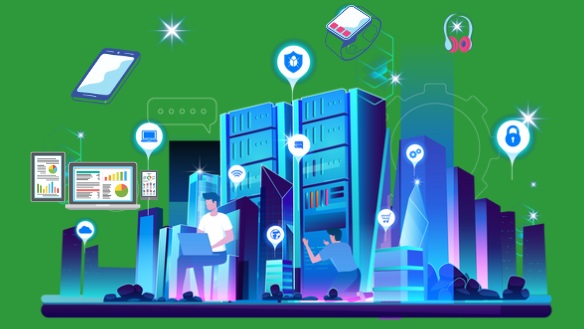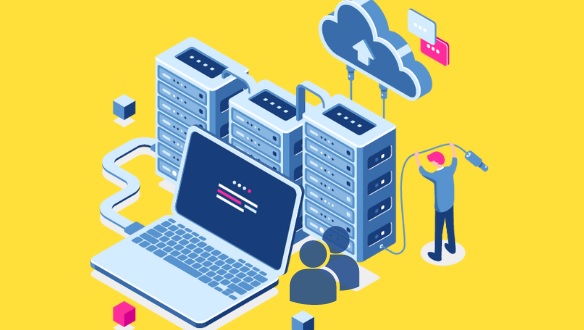From personal computers to supercomputers, we shall examine several types of computer system in this article. Try to comprehend their special qualities, uses, and contributions to various industries. Learn about the diversity and advances in computer technology that influence our contemporary world.

Computer System
In today’s society, computers rank among the most essential devices. It engages a broad range of jobs, from simple data entry to intricate calculations and simulations. Hardware and software are just two of the many components that make up a computer system. That works together to enable it to perform its functions. hardware, which consists of physical devices such as processors, memory chips, and storage drives that make up. The hardware interacts with software programs installed on it which allow us to access certain features or applications within our computer systems like word processing or web browsing.
Types of computer system
Depending on size, use, and architecture, computer systems can divide into numerous types. Some typical varieties are exposing below:
Personal Computer (PC):
It is a functional and popular computer system created for lone users. This is shaped by a central processing unit (CPU), memory, storage, input/output, and a monitor. PC software consists of an operating system for controlling resources and programs for doing different tasks including word processing, web surfing, multimedia, and gaming. Users can adapt their PCs to their unique demands thanks to the flexibility and customization choices they provide. They offer a platform for productivity, communication, and entertainment. And nowadays, we can find it in households, offices, and educational institutions.
Mainframe Computer:
A mainframe is a powerful computer system created for large-scale, mission-critical applications in businesses. It manages enormous volumes of data and needs high levels of performance, security, and reliability. Multiple users can support continuously, transactions can process quickly. And complex input/output activities can handle by mainframes. They frequently use sophisticated software systems for workload management, virtualization, and resource optimization together with cutting-edge hardware architectures, including redundant components and specialized CPUs, in sectors including banking, finance, government, and large-scale data processing, where scalability, stability, and data handling capabilities are essential for handling vast workloads.
Supercomputer:
Powerful computers that are rapid and accurate in solving difficult issues are known as supercomputers. It has the ability to handle billions of calculations per second. This puts it among the quickest computers currently in use. Scientific research, weather forecasting, climate modeling, artificial intelligence (AI), and other tasks needing colossal processing power are all performed on supercomputers. Also, they are used in enterprises to execute simulations. Or analyze massive volumes of data that would take too long on standard computers. Its capability has grown significantly over time as technology has advanced. Today’s supercomputers use thousands or even millions of processors working together in parallel to achieve maximum performance levels with minimal energy consumption compared to traditional computers using single processors alone. This allows them to process more information faster than ever before while consuming less electricity than older models did when running at full capacity.
How does a computer system work?
Through the sequence of phases, including input, processing, and storage, the computer system processed data. The user enters data through devices like keyboards or mouse, which the central processing unit (CPU) processes. The CPU reads information and commands from memory, processes them, and then stores the results back in memory. Memory, including RAM and storage devices, is used to store information. And instruct for quick access. The processed information is shown or produced by output devices, like displays or printers. The operating system controls the system by controlling resources, coordinating software and hardware interactions, and offering a user interface. The computer system is able to effectively carry out a variety of activities and run programs thanks to this constant cycle of input, processing, storage, and output.

The current trend: types of computer system
Computer systems are in an exciting period right now. As new technologies and developments in artificial intelligence make computers smarter than ever. The future of computing appears more promising than ever, thanks to improved automation and more potent CPUs. Users may now access data from any location with an internet connection. With the help of cloud computing services offer better security safeguards. Now to enhance the user experience organizations are operating technology like augmented reality and virtual reality.
Future of computer system: types of computer system
The possibilities for computer systems’ future are essentially endless, which makes it highly fascinating. Computers will become quicker, more powerful, and capable of doing more complicated jobs as technology advances at an exponential rate. AI will likely evolve to the point where machines can think similarly to humans. Data will also be easier to access from any location with an internet connection. Thanks to the continued development of cloud computing technology. We may anticipate a world where anything is possible thanks to these developments!
The computer system is an invaluable tool in our modern world. It has completely changed how we interact, work, and store information. From its earliest days as a bulky mainframe to today’s sleek laptops and tablets, computers have drastically changed how people interact with one another and access data. With their incredible speed of processing power and ability to connect us across vast distances, computers are essential for businesses large or small to remain competitive in this ever-evolving digital age. It provides an entirely new universe of opportunities for people who desire to engage in artistic activities or pick up new abilities. In conclusion, it’s safe to say that the computer system has become an integral part of our lives – both professionally and personally – making it hard for us to imagine life without them!
